App Review: Basecamp

Basic camping trip or five-star hotel?
I review apps based on the perspectives of a business analyst, an information technology specialist, and a pun aficionado. If you like this content, subscribe to my site and follow me on social media.

Basecamp
Simple and easy project management for an amazingly low price
Tired of doing project status meetings and catchups (not the same thing as ketchup)? You feel the left hand doesn't know what the right hand is doing in your company? You often feel overwhelmed by e-mail threads, tickets, and user stories? Basecamp offers a minimalist-by-design app that focuses on what matters the most: simplicity.
Business Analyst Take
As a BA, I want to see how this application can enhance my team's productivity. If I am part of a large enterprise, or consulting small businesses, I need to justify the ROI for a high-priced product. Plus, "Basecamp" sounds a little campy, right?
Exploring the app
Below is what I was able to accomplish within an hour of using the app's free tier. I began by creating 3 projects in the web app using the convenient step-by-step onboarding: "outreach program", "ppfosec privacy" and "ppfosec publishing". Basecamp provides "tools" such as calendars, docs & files, message boards and To-Dos, which sit on top of built-in messaging systems and cool "automatic check-ins" that send reminders on behalf of managers. I quickly felt that the app was emphasizing collaboration so I created 2 users, Nocitak, and outside brand and creation consultant "So Yiji".

So Yiji says so!
I looked up the Windows app (3rd picture), feeling it looked similar to the web app. Finally, I tested a Zap between Basecamp and Airtable to see whether I could use Airtable as a "back-end" for reporting since Basecamp offers limited reporting in my opinion (at least in the free tier).
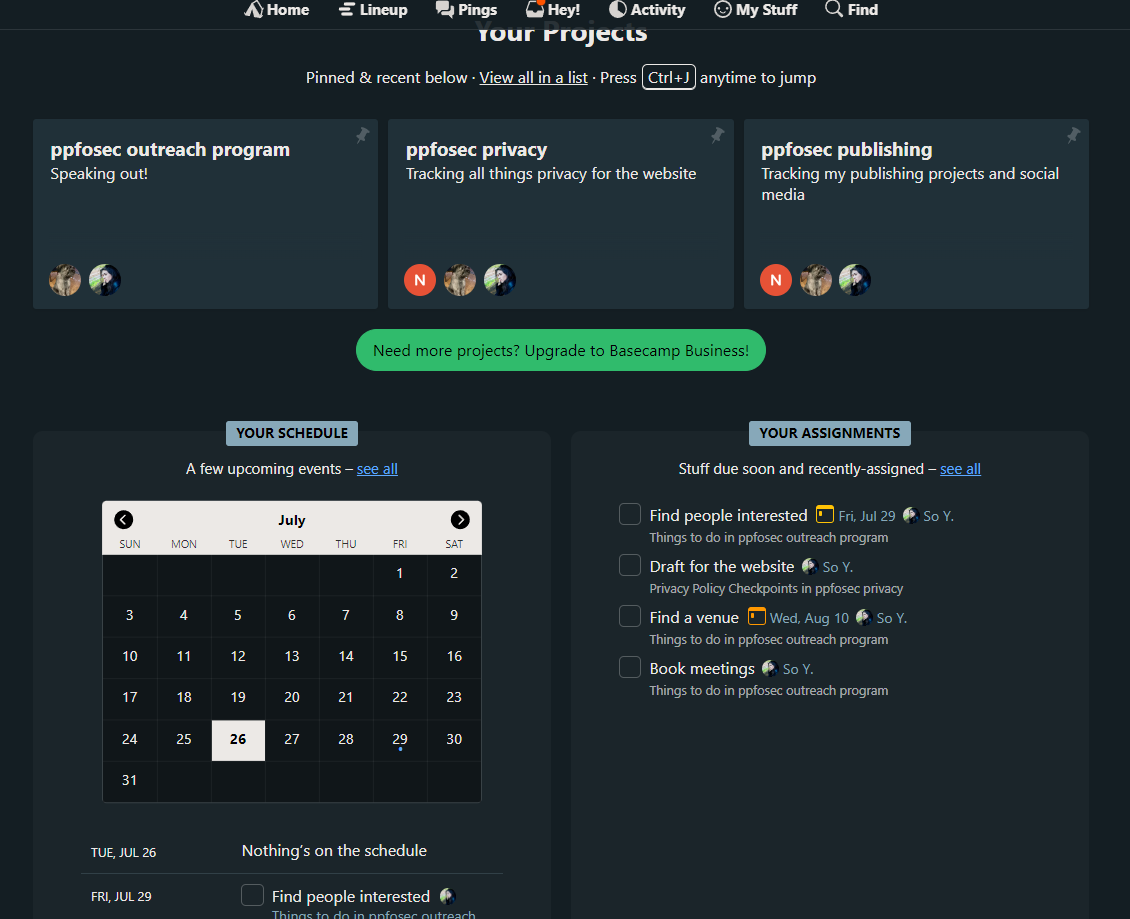
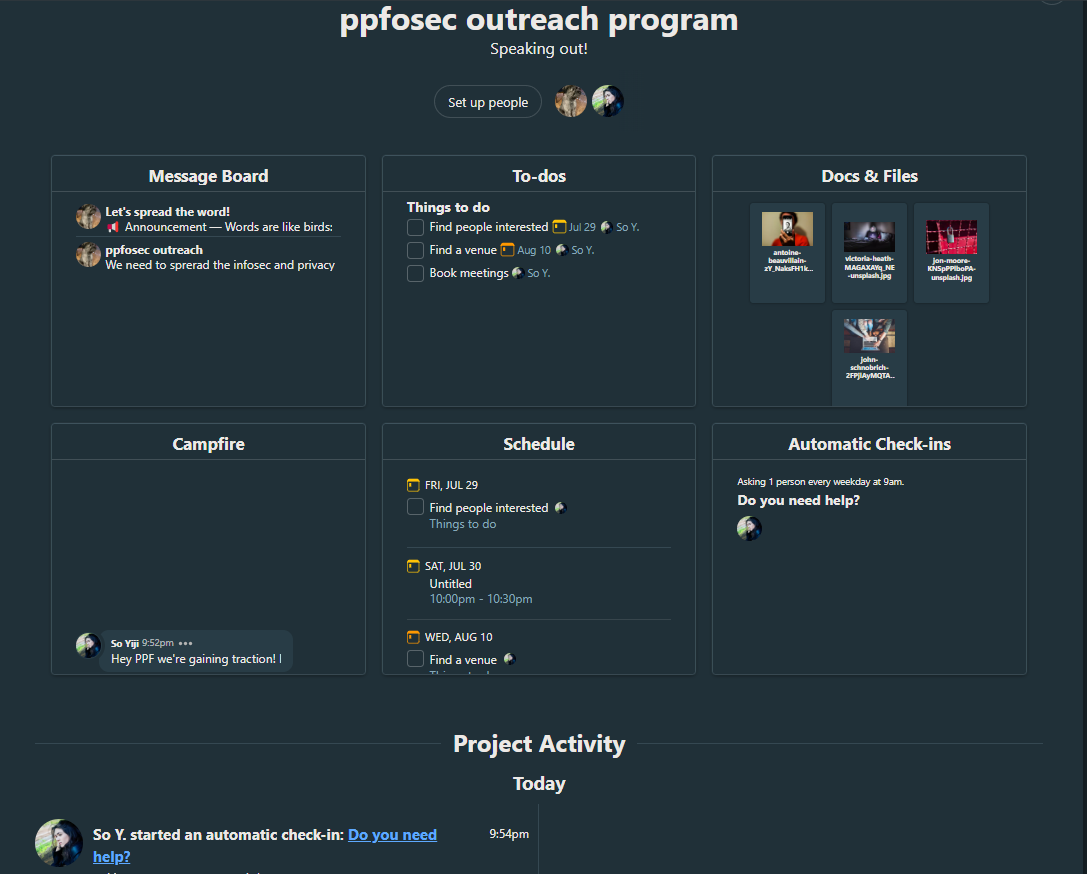
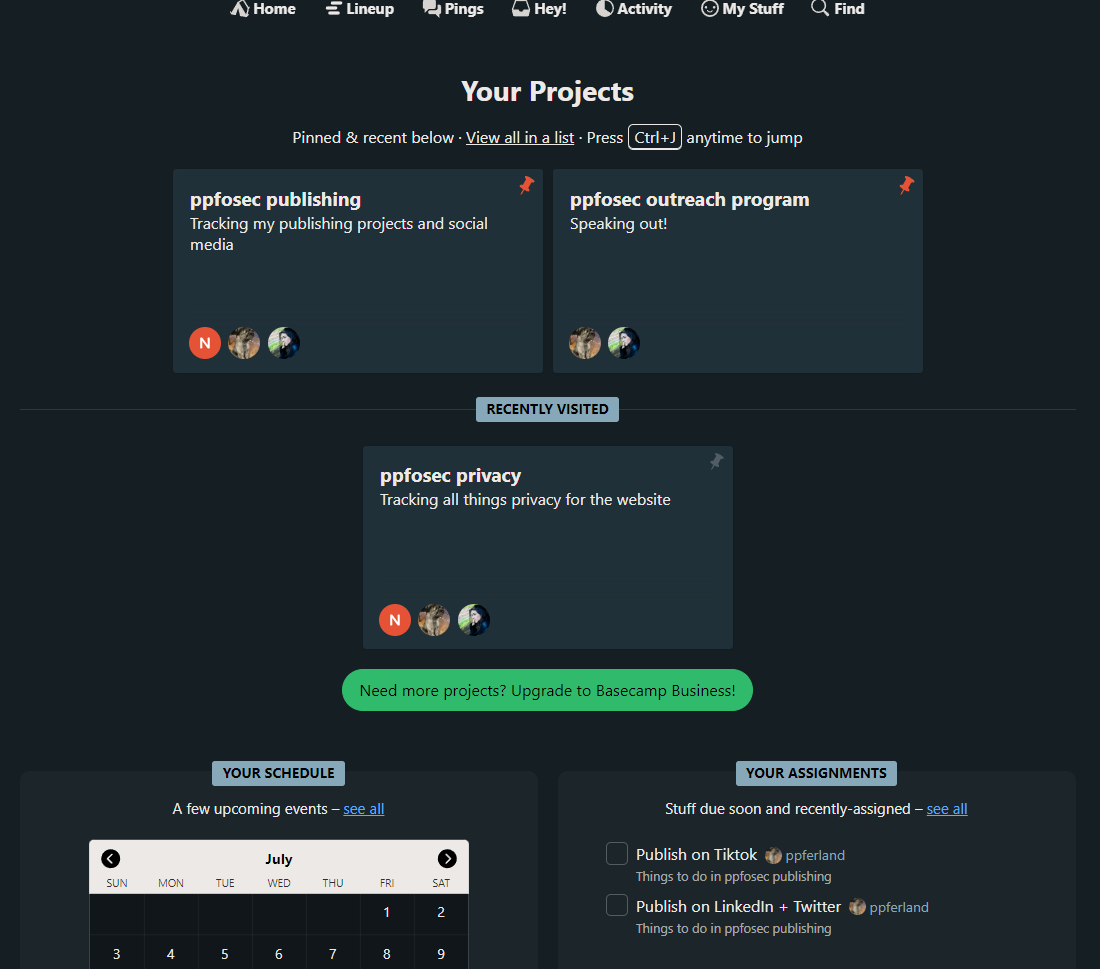

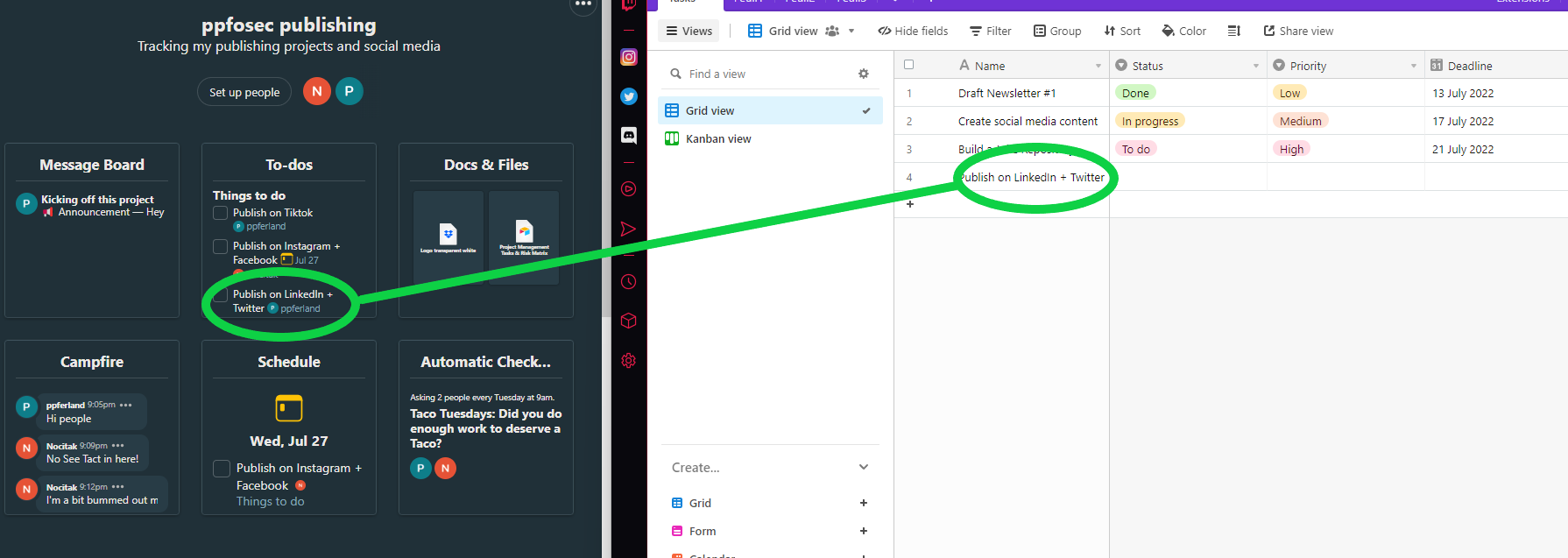
To be honest, everything about Basecamp felt "meh" until I opened up the mobile app. The iOS app propelled my biggest "wow" moment since I've been doing app reviews. In fact, the mobile experience is such a game-changer; it made me reconsider everything about Basecamp. Let me show you! In the first picture below, you see the landing page for any given project. One single glance, no swipes, and I know everything about the project. The app also provides curated "Recent Activity" to keep up easily. The messaging section looks basic but it can be used as an instant messaging system. I tested a three-way conversation on the web app, Windows client and mobile app and it worked seamlessly (aside from me switching devices like a maniac). Documents can be embedded from outside sources such as Notion and Airtable and generic "messy notes" and standard "Notes" documents are available.
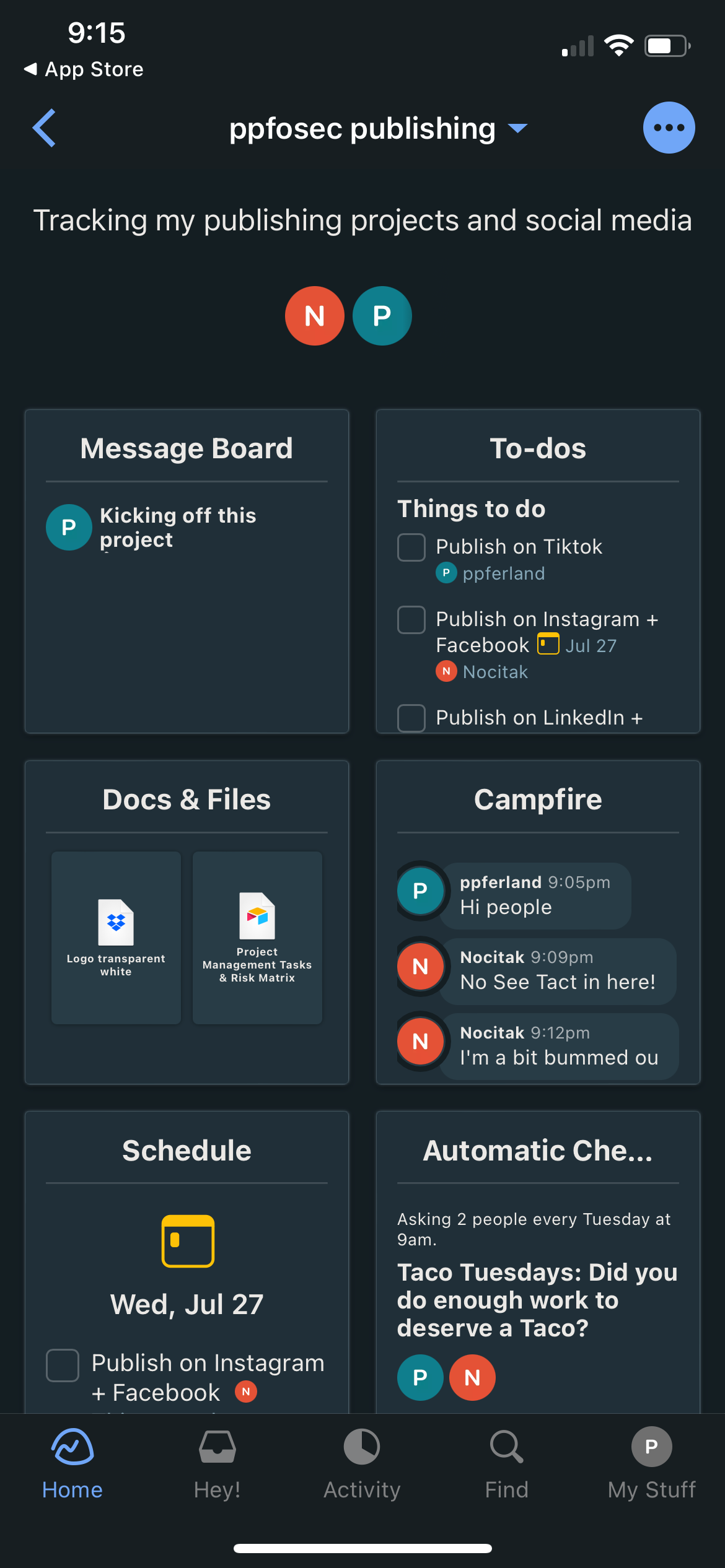
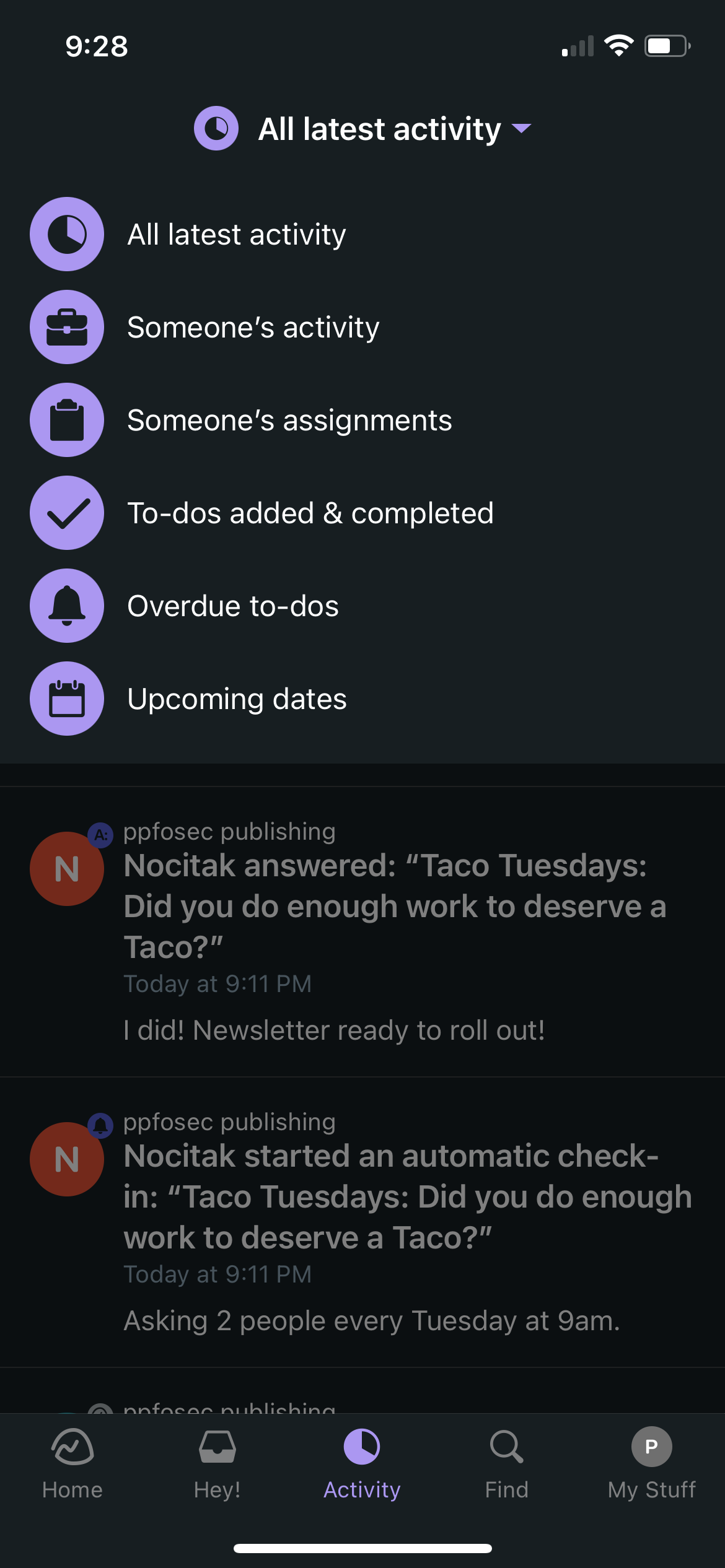
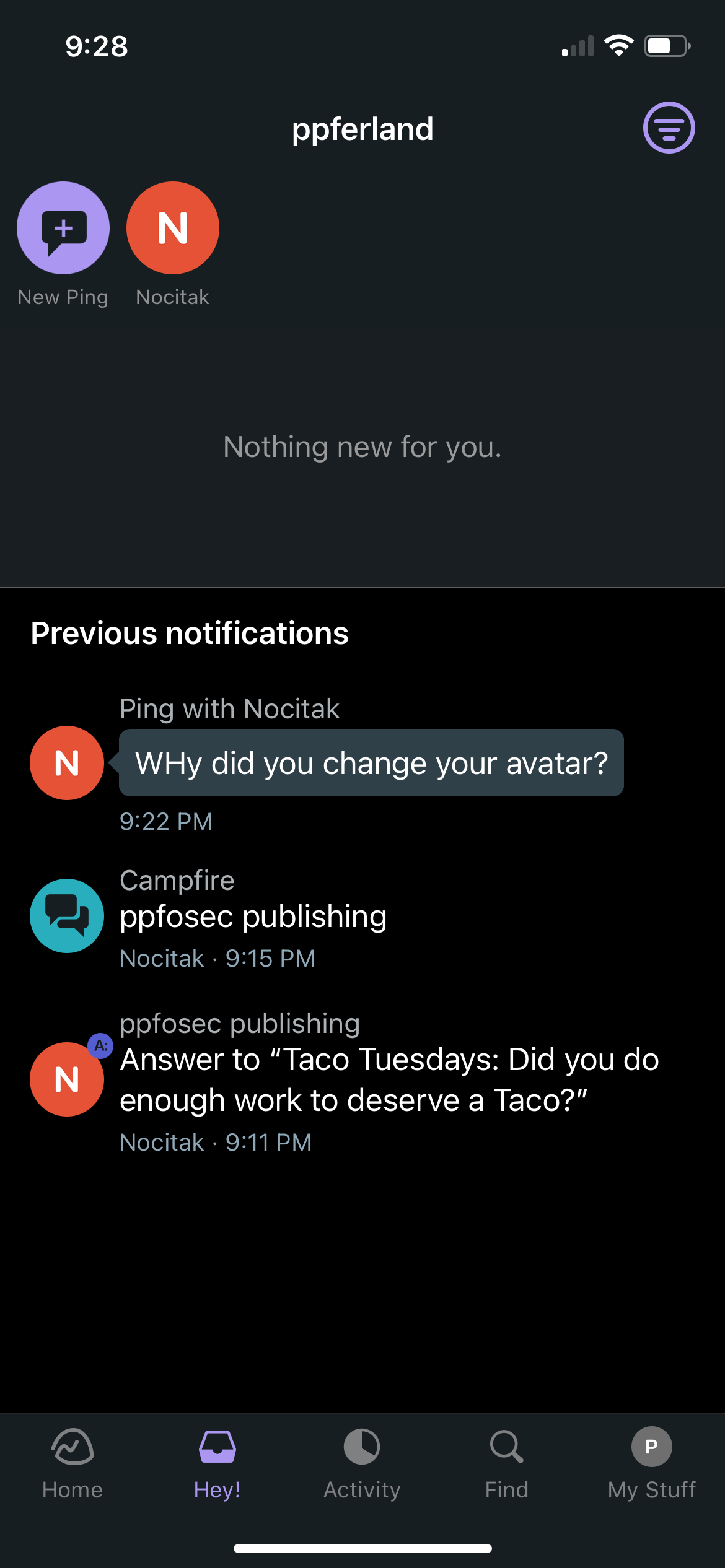
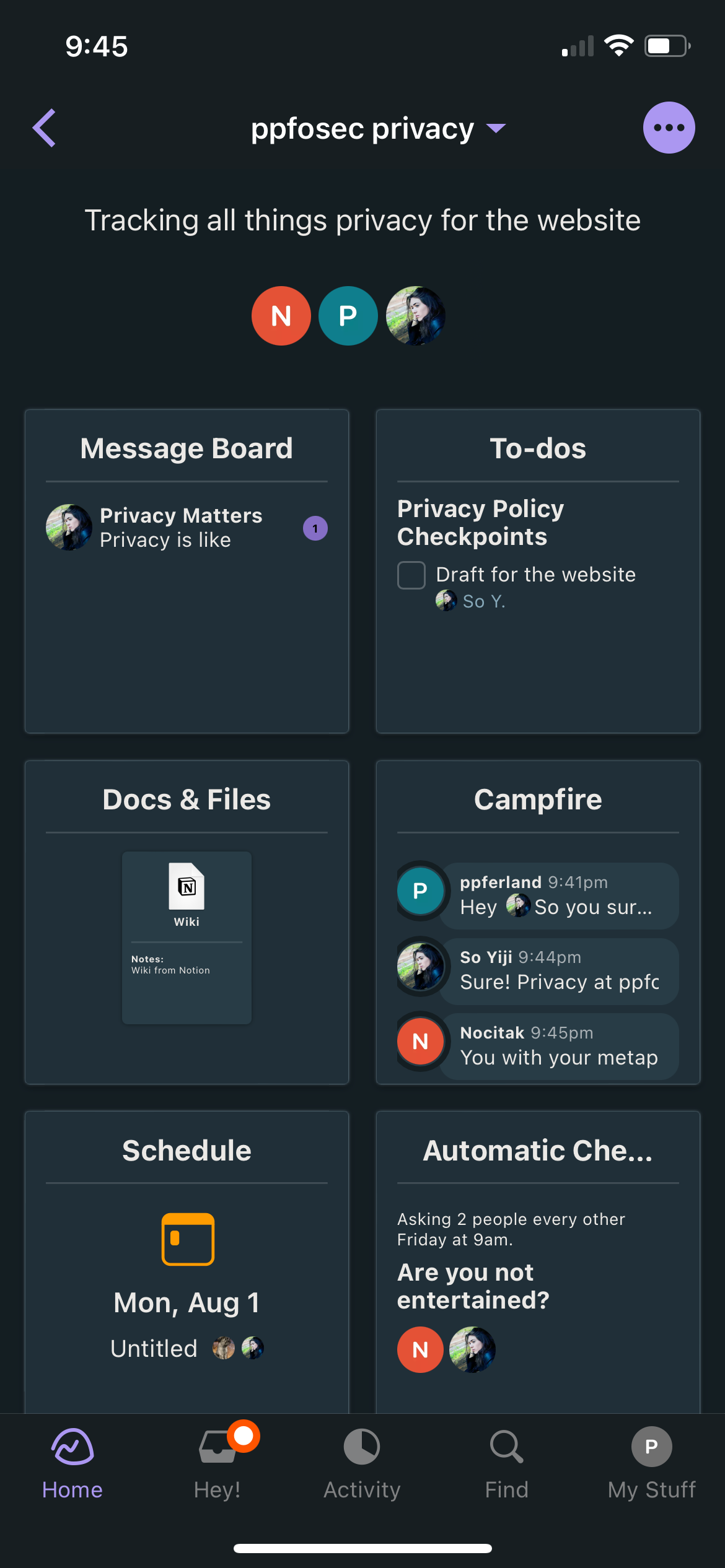
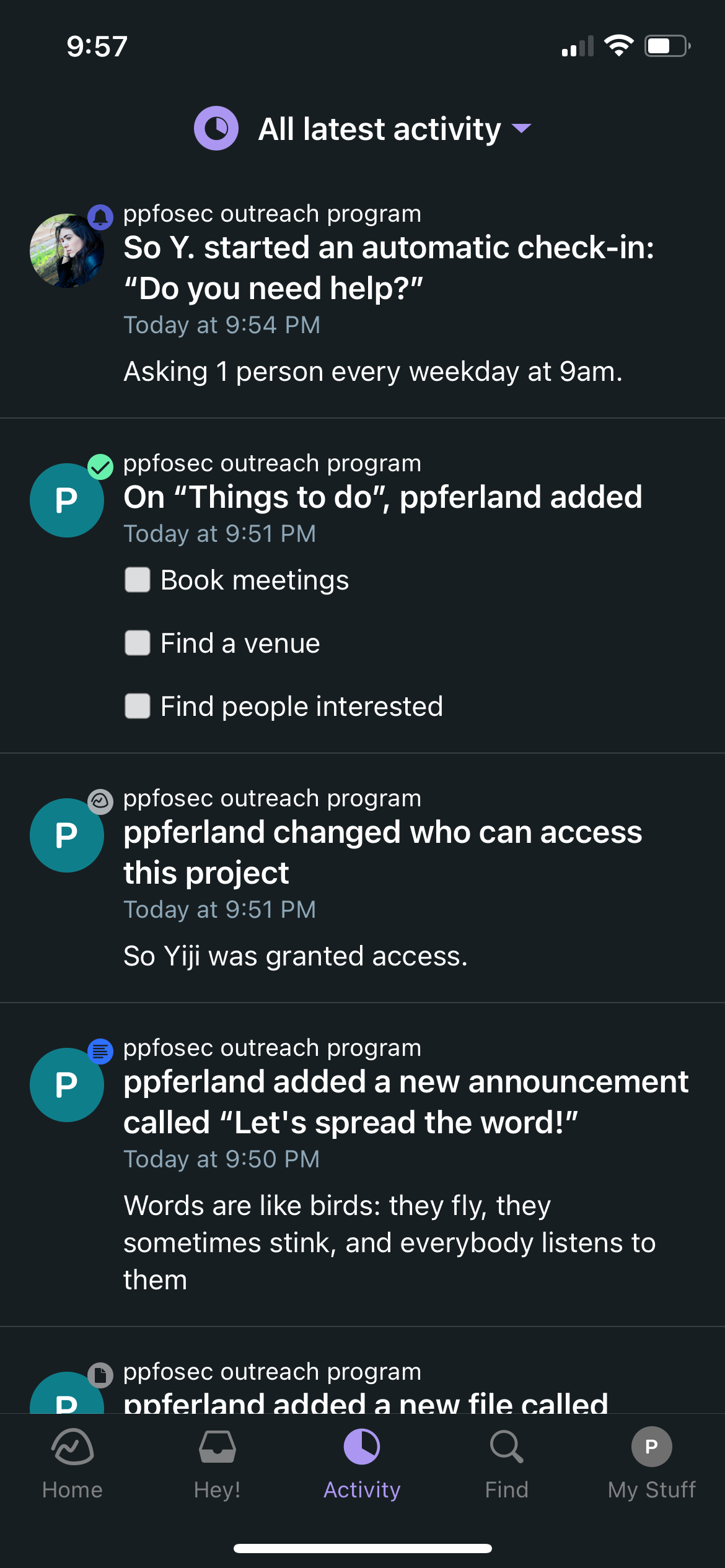
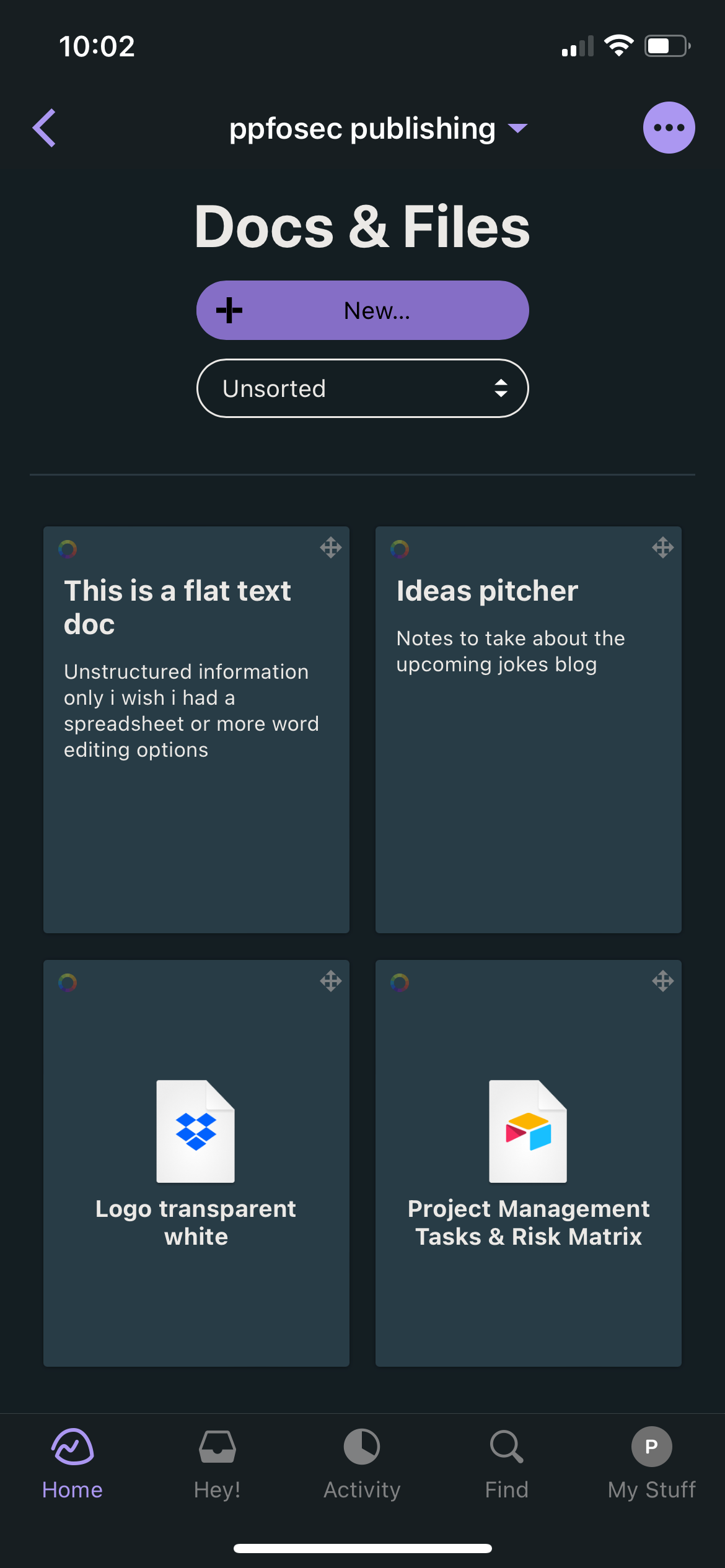
The amazing convenience of the mobile app gave me the confidence that Basecamp could enable me to rely solely on mobile for the huge chunk of "collaboration" that is necessary for any work while using my desktop in "focus mode" to do the actual work. Isn't that a cheerful feeling?

Recommended Use Cases
Given the aforementioned mobile awesomeness, Basecamp is perfect for any business where people do not spend all day behind their computers but still need an impressive amount of paperwork. Think of construction contractors, interior designers, retail managers, electricians, delivery people, teachers, surveyors, inspectors, etc. Yes, this is probably over 40% of the workforce who nowadays are still using paper! But everybody has a smartphone! Unlock that power!
I once hired a company to complete some landscaping and the project manager kept sending e-mails, making phone calls, and having bills paid and signed all over just to ensure that dirt, lawn, stones, and flowers were delivered on time. All the while, he was calling me to update me on weather conditions and their expectations and getting feedback and reviewing the plans, the submission, plus roadblocks... See the gist? I am absolutely certain this project manager could double his output if he used Basecamp because he never would have needed to make a single phone call. My shrubs looked top-notch, thanks for wondering.
Above all, you want Basecamp to plan your wedding.

See? Perfect
Limitations
It is hard to discuss the limitations of Basecamp since most of them happen by design. The following interview with Basecamp's CEO explores the company's philosophy. Their mottos include statements such as "Grow slowly or not at all",
"Build half a product" and "Underdo your competitors".

Learning about the corporate culture also brought me a new perspective on the product itself. Are those missing features truly necessary for my productivity and peace of mind? It also made me realize I had never used the term "underdo" (say it out loud fast, you'll thank me).
Nevertheless, concerns remain. In my opinion, Basecamp's messaging is tied too tightly to projects. Maybe the company feels Slack threads cause cognitive overload. I disagree. I think casual conversations must breathe into work. Electronic messaging plays a significant part in building bonds and company culture. Basecamp's messaging is not up to the task. It may sound silly to criticize an app over the limited choice of emojis, but this is where we are in 2022.
In addition to communications, Basecamp needs to integrate with a 3rd party spreadsheet app. In my experimentation, I used spreadsheet powerhouse Airtable. Basecamp believes they can solve project management and collaboration. Yet I am not sure they can achieve that goal without good spreadsheet support.
Basecamp relies on Zapier for integrations. However, as a business analyst trying to figure out a "top-down" architecture, all I can see is external applications growing into a maze around Basecamp. Plus, its API documentation is a GitHub repository which lacks polish.
Finally, I think Basecamp probably struggles in an enterprise setting. The mobile experience I belove will not remain seamless once the system ingests 600 projects. When reaching that level, Basecamp's limited reporting features will crumble. I also feel Basecamp's de-centralization could put off CIOs and IT Directors. Basecamp in large enterprises will grow into a big graveyard of "Internship 2020" and "PoC Puppy Pic generator" projects that clutters the experience. Don't get me started on inviting outside consultants to projects without IT oversight...
Pricing
Basecamp charges a flat rate of $100/month. Simple as that. This is the part where I would normally criticize the company for pricing way below their RoI, which will end up biting them and their customers back due to pressure from investors to grow. But Basecamp is about building a slow-growing profitable business, therefore invalidating both my criticism and my apprehensions.
Competitors using per-user pricing will tout their more diversified features, which Basecamp has chosen to not implement. For example, Basecamp believes Gantt Charts to be useless. Focus on usability likely means not to expect AI-driven innovations either.
The extremely advantageous price suggests Basecamp will not spend to negotiate custom contracts. Terms will be provided as-is, and they include language that will make your lawyer feel like this:

Do not show these clauses to your corporate counsel
"We have the right to suspend or terminate your account and refuse any and all current or future use of our Services for any reason at any time."
"Your use of the Services is at your sole risk. We provide these Services on an “as is” and “as available” basis. We do not offer service-level agreements for most of our Services"
"There are some edge cases where we may send your data through our network unencrypted."
"You expressly understand and agree that the Company shall not be liable, in law or in equity, to you or to any third party for any direct, indirect, incidental, lost profits, special, consequential, punitive or exemplary damages, including, but not limited to, damages for loss of profits, goodwill, use, data or other intangible losses [resulting from] [...] breach of contract, tort (including negligence whether active or passive), or any other theory of liability."
Technology Review
As an IT expert, I want to open the hood and see how this machine is built. I want to know everything about hosting, security, integrations, data processing standards, off-shore information transfers, privacy practices and what silly name the HR department came up with to name the employees. Campers? Base-crew?
Hosting
Basecamp is a cloud app which lists both AWS and Google Cloud as hosting providers. The absence of open job postings makes it harder to understand Basecamp's architecture. Basecamp has existed for nearly 20 years. Its current app is labeled "Basecamp 3". I would be astonished if Basecamp wasn't stuck with legacy code.
Its low price and inflexible terms suggest influence from customers on the product roadmap must be very limited. Basecamp charges 100$/month, whether you are my landscaping mastermind or a Fortune 100. They have no upsell interest. They will focus on their own definition of a great app. I can't see this vision being appealing to large enterprises that want partnerships.
Security
Basecamp's security leaves me perplexed. The "Security Overview" paper is buried in the terms section of their website and while I appreciate the effort, there are some weird claims such as using a weak cipher for encryption in transit and adding that application databases are not encrypted at rest.
The paper also claims that Basecamp keeps a "streak of 0 breaches". I dislike this presentation since 1) the best way to keep a 0-breach streak going is to fail to detect them and 2) the absence of breaches is not the lone indicator to determine the success of a security program and security architecture. Plus, a company that builds its security marketing around a "0-breach streak" has an incentive to not disclose a breach once it happens.
Basecamp maintains a public bug bounty. I reviewed some tickets and their practice looks mature, which alleviates some of my concerns about their security claims.
Conclusion
Pros
- Best mobile app for work management and productivity, unlocking the full potential of working from your smartphone all day
- Do you really need something else? Okay, for the record...
- Minimalist design focuses on the core project delivery mission (also known as getting shit done) without over-management.
- Convenient files & docs storage
- The versatility of project boards allows self-organizing teams to thrive
- Compelling company culture can be felt in the product
Cons
- Messaging feature lacks festiveness
- Horrendous limitation of liability
- Relies on 3rd party Zapier integrations and API lacks polish
- Unfit for large enterprises
Verdict
- Basecamp can change the lives of two types of workers at opposite ends of the spectrum: knowledge workers overwhelmed by bureaucracy and smartphone owners who have better things to do than navigate a bunch of scattered documents.


